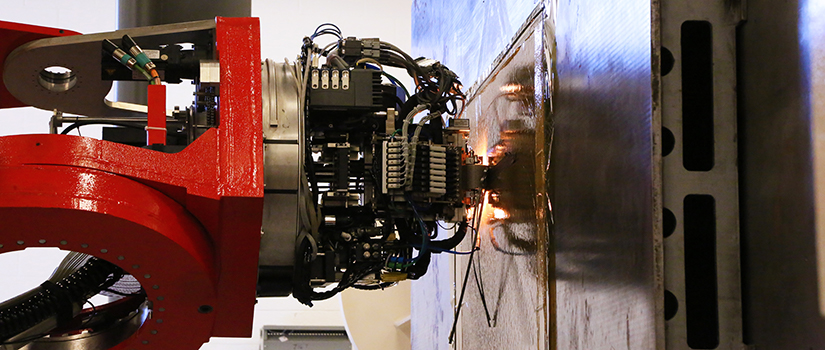By Abe Danaher | June 30, 2020
In seven years, the University of South Carolina’s Ronald E. McNair Center for Aerospace Innovation and Research has gone from a simple dream to a full-blown reality. Using a unique model that pairs industry partners directly with faculty and students, the McNair Center has made itself an integral component of South Carolina’s aerospace industry and a key player in its future.
Leveraging the presence of over 400 aerospace-related companies in the state, the center has become a leader in advanced composites, thermoplastics, induction welding, metal and composites 3D printing, combustion, robotics and automation, non-destructive evaluation, digital transformation, and more. From Boeing to Lockheed Martin to General Motors to Safran, the center’s interdisciplinary expertise and one-stop-shop approach has made it a premier destination for manufacturing companies seeking world-class research and development.
“There are many, many centers doing composites in the United States, but they don’t do this,” says Michel van Tooren, an early director of the McNair Center. “They don’t have an Automatic Fiber Placement machine. They do not do industrial scale thermoplastic composite manufacturing. They don’t have an autoclave that can go to 800 degrees Fahrenheit and accommodate industrial scale samples.”
The center’s success has put the University of South Carolina on the map in the world of advanced manufacturing. Now, its leaders hope it can help the state of South Carolina do the same.
“Part of the role we play is working with the South Carolina Department of Commerce to offer a full package for aerospace manufacturers when they come to the state,” says Abdel Bayoumi, the current director of the McNair Center. “So not only is the Department of Commerce offering incentives and helping set up infrastructure, but it is giving manufacturers the opportunity to also support and perform research and development here in the state.”
The dean of the UofSC College of Engineering and Computing, Hossein Haj-Hariri, says until now it has not been easy convincing companies to move their research and development to South Carolina. For decades, aerospace companies have done their research and design work in California, Washington state, and abroad. But, in the past five years, the McNair Center has made it possible for companies to begin bringing this work to the Palmetto state. Haj-Hariri expects them to bring even more after seeing the McNair Center’s capability to perform research and development at a very high technology-readiness level, rivaling or surpassing those of industry R&D centers.
“In the words of Governor McMaster, we need to be the smart manufacturing state. Which means we do the design, we do the leading-edge research, we push the state-of-the-art in manufacturing. We can do that. We are doing that,” he says. “We will continue to drive the companies to trust us and take the leap. We will catch them.”
Bobby Hitt, South Carolina’s Secretary of Commerce, recently pointed to the McNair Center’s success in bringing high-paying research and development jobs to South Carolina. In his June Commerce Communication, he wrote about the state’s commitment to remaining on the cutting edge of technology and maintaining a high-tech workforce, and the importance of increasing research and development to make this happen.
He said, “In the Palmetto State, we understand that to fuel passion and ingenuity, and break barriers, we must make a commitment to research and development. One such resource is the University of South Carolina's Ronald E. McNair Center for Aerospace Innovation and Research.”
This confluence of industry and education is exactly what the center's original donors – Darla Moore, Anita Zucker, and Marva Smalls – wished for, what van Tooren envisioned when he helped found the McNair Center seven years ago, and what Bayoumi continues to build upon today.
Now, they hope this center is a key to the state of South Carolina realizing its own dream. They hope that the research and development they’ve done is just the tip of the iceberg, and that through the McNair Center’s work, South Carolina’s reputation as the smart manufacturing state can be established and cemented.
“This state is brimming with potential,” Bayoumi says. “Top industry partners are here, our world-class faculty are here, and every year, more and more top-flight students are produced here. South Carolina is ready.”
